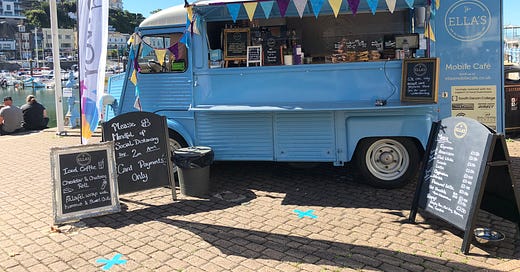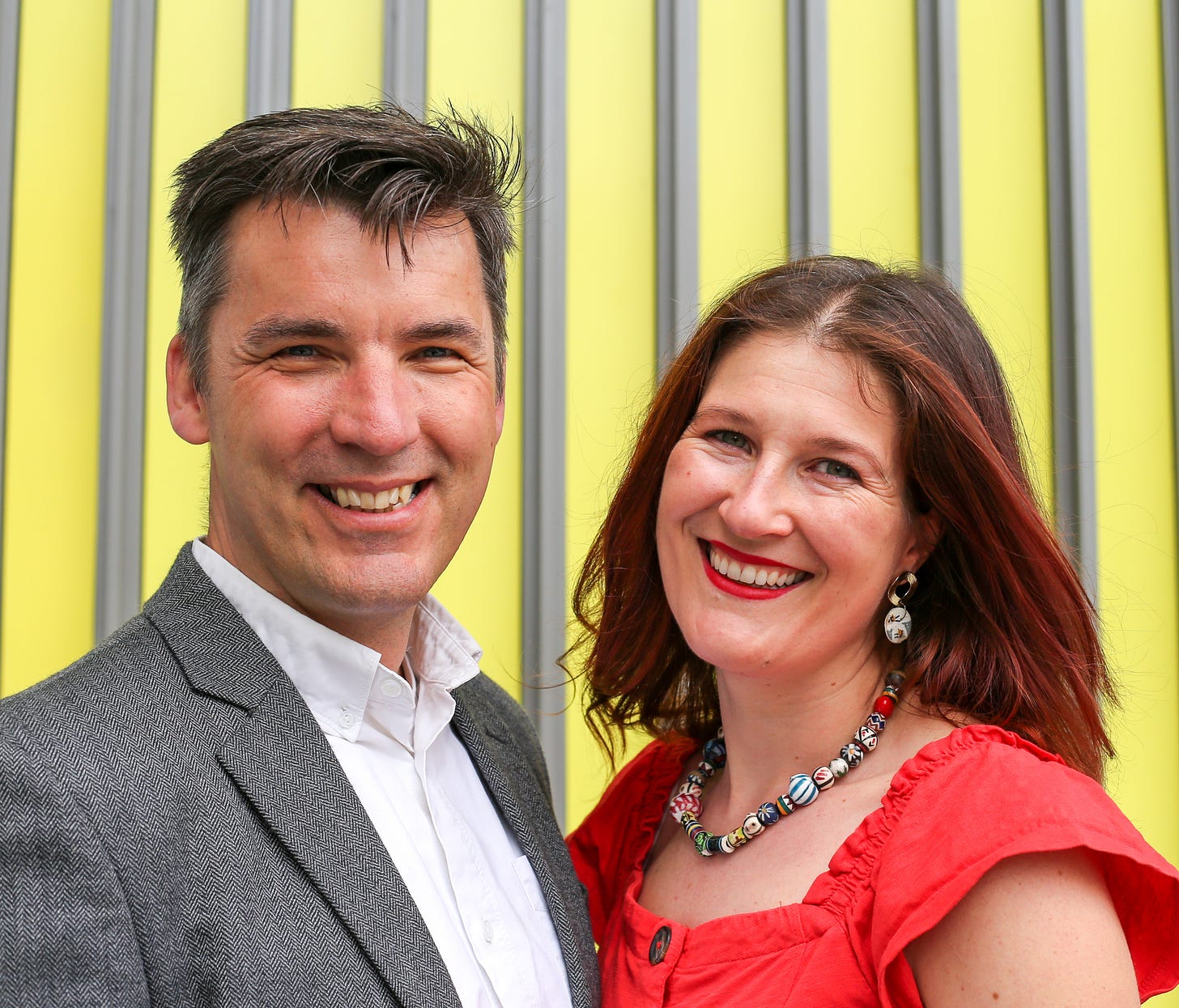Today’s article…
…is a follow up to a piece we wrote back in 2021.
Called ‘What an ambitious fundraising strategy actually looks like’ it’s one of the most visited pieces on our website.
It’s a case study of Rowcroft Hospice, whose leadership team were determined to counteract the instability of voluntary income by investing in multiple new commercial enterprises.
We wanted to know how things were going three years after the seeds had been sown and we’re delighted to share an update with you today.
Get ready to be inspired!
Huge thanks to Mark Hawkins and Ali Upton for so generously allowing us to share this story with you all. Do give them a follow on LinkedIn and take a moment to thank them if you enjoyed reading today’s article.
Tony and Caroline
Want weekly articles?
If you’re not already a paid subscriber, we would love love LOVE to have you on our team.
The Nest Egg isn’t just a newsletter (though we do like to spam you with pics of our dog) - it’s a hub of information and inspiration for all of us navigating the choppy waters of income generation in the For Impact sector.
For £70 a year or £7 a month you can:
Enjoy a weekly (extra juicy) article delivered straight to your inbox
Access to full archive of articles - check it out here
Comment on all posts and chat with other readers
Extra puppy spam
Play your part in democratising training and education for fundraisers and non-profit professionals
Is commercial income going to save us?
by Caroline Danks (in collaboration with Ali Upton and Mark Hawkins from Rowcroft Hospice)
Picture description: A vintage blue van serving coffee, parked on Torquay’s seafront.
When fundraising alone won’t cut it
Back in 2018/19, following a difficult few years for Rowcroft, it was recognised that the growth required to serve current and future need was never going to be covered by fundraising alone.
The board recognised a need for new streams of income. There was (and is) a ceiling to voluntary income, especially for hospices where you’re geographically restricted to your immediate community and need to be mindful of donor fatigue.
Like all hospices, Rowcroft has continued to face increased financial pressures in recent years - due to many factors including rising costs, a national drop in charitable giving, low and stagnating government funding and a growing demand for end-of-life care. With less than a quarter of Rowcroft’s funding coming from the NHS*, the need for community support and funding is crucial to ensure the continuation of important services.
So the board agreed to trial new ideas.
*if you want to feel outrage and inspiration in equal measure, Hospice UK’s recent campaign on Hospice income is a rabbit hole we highly recommend falling into .
The really clever thing about Rowcroft’s plan..
…is that the new businesses set up to generate income were never intended to be purely for profit.
It was important for Rowcroft that each new business engaged local people more deeply and if possible, served members of the community who would likely need hospice care in years to come.
Creating complementary offerings would not only deliver a financial contribution but would respond to community needs and in doing so, could ultimately improve the way in which hospice care is delivered.
Win win all round.
Back in 2021
At the time of writing the first article, leaders of Rowcroft Hospice had added the following enterprises to its portfolio of commercial enterprises (which were retail)
Devon Farm Kitchen - A premium, frozen meal delivery service using locally sourced ingredients
The Ella Rowcroft Endowment Trust
A new café and take away outlet
Since 2021…
Rowcroft has continued to invest in each of these enterprises and trialled an additional social enterprise (working with occupational therapists and local building firms to provide hassle-free home adaptations). It was decided however not to pursue this business idea and instead to focus on existing businesses alongside a grander vision…
Grand designs
Palliative care is no longer about treating those in advanced stages of cancer or neurological diseases. More and more of us are living longer with multiple complex conditions combined with the mobility challenges which come with frailty and old age.
For an older people with all of these intersecting health conditions, plus dementia, predicting when they’re going to need hospice care is not simple.
Rather than pain management in the two weeks or so leading up to someone’s death, patients need multiple medical interventions for a myriad of conditions across a long period of time.
In recognition of the need for better support for people living with dementia in South Devon, Rowcroft leaders have successfully applied for planning permission for a brand new 60 bedded specialist dementia and complex nursing home, on the existing hospice site.
This facility will provide a much-needed community service, will deliver profit back to the charity and will help hospice staff to understand how to better serve patients and their families.
Niching down
Recognising the lack of local support for people with advanced dementia, Rowcroft have applied their existing knowledge to the topic and have sought to develop their organisational expertise even further.
In March 2024, the team hosted their first ever National Dementia Conference:
“While we are known as a leading provider of palliative care services in the region, we recognise the increasing demand for specialised dementia care within our community. Our conference will delve into the latest advancements, innovations, and research in dementia and the vital role of palliative care in enhancing the quality of life for individuals living with dementia”.
The conference brought together experts from the public, private and social impact sectors. It enabled Rowcroft to start to build a reputation and further credibility in a specific niche, develop relationships with potential collaborators, learn more about pioneering treatments and garner support for its upcoming plans.
In addition, it’s another opportunity to make money for the charity and was so successful that it sold out with a long waiting list. Due to popular demand the next conference is already scheduled for 25th March 2025 (do save the date and share this link with anyone who might benefit).
Complementary offerings
There are plans to build a 40 bedded assisted-living facility on site (alongside the 60 bedded nursing home). This makes the most of the space and the building available, whilst meeting community need and helping to generate income in a way which is supportive of charitable objectives.
Alongside these ambitious building projects, the team are planning a full refurbishment of the inpatient unit.
Lessons and reflections
1. Build on existing successes and ideas
Don’t re-invent the wheel. Like a brand new fundraising endeavour, setting up a new business is expensive in time and money.
Working with what you’ve already got is not only more efficient from a financial perspective, but it will also enable you to make the most of your existing people (before you find you need to make new hires).
Rowcroft examples:
Retail team also looking to set up a house clearance service
Expanding our excellent hospice care into dementia care
In person retail to online
Occupational therapy assessments combine with a home adaptation service
Great financial management and a robust reserve policy extends to an endowment
2. Don’t do everything immediately
New businesses suck up resources so it’s unlikely you’ll have the capital to implement all of your ideas at once.
Charity boards are typically risk averse so taking a slow and steady approach to building your businesses can help calm nerves.
Ensure you build in plenty of space for reflection and learning from your mistakes and failures, and have a system for knowing when to quit and when to keep going.
3. Consider niching down
Is there an as-yet-unexplored niche or sub-sector which you could inhabit?
By expanding your knowledge and services, you could:
make existing services better
create new services
expand your money making potential considerably
Even if you’re not planning to share your new found knowledge more widely, simply staying on top of a particular topic (such as AI and tech developments in palliative care) can help you to inform the direction of your services in the future.
This goes for all professionals across all sectors.
Become an expert in something which interests you and watch big things happen.
Involve your donors
So many charities worry that ‘they don’t have anything to ask for’ because they don’t currently have a huge, shiny project happening.
Others refrain from asking their donors for anything because a huge shiny project is coming down the track and they want to wait.
Even at the early stages of development, there are things you can (and should) share with your supporters:
Exceptional day to day work which costs a huge amount of money (and is totally worth every penny)
Innovative plans for financing the work
A desire to become experts and to educate themselves and others
If I was a Rowcroft donor, I’d be desperate to know everything about this exciting journey as it unfolds. It would be so sad to be presented with the finished product, knowing that the journey to get there would have been a fascinating one, rich in learnings applicable to so many situations.
So often donors can (and want to) help with more than just money.
It’s an easy thing for fundraisers to forget, especially as we’re often scared to present a draft version of an idea for fear of it not working out.
Share your process with those who want to help and have the expertise to make a good idea even better.
A final word from Mark:
“At Rowcroft, we understand that as a charity, we must adopt sound business principles to ensure our long-term sustainability. Managing our resources wisely is essential, so we can continue delivering the best care for our patients and community.
By embracing these principles, we can operate efficiently, provide essential services, and ensure that we’re always meeting the needs of those we support. It’s about making every decision count for the greater good.”
We hope you loved this case study! Huge thanks to Mark and Ali for sharing it with us.






